#helen shingler
Explore tagged Tumblr posts
Text

Mondays with Anthony Head 80/?
Tony with his mother (Helen Shingler) in 2017
20 notes
·
View notes
Text

Peter Cushing and Helen Shingler study the script "Home at Seven". Peter will be seen as David Preston, the quiet home-loving bank official who returns to his suburban home at his normal time of seven o'clock to find that by some trick of amnesia he has been missing for 24 hours and is suspected of murder. Helen plays the distracted wife.
Helen Shingler is Anthony Head's mum. This guy

18 notes
·
View notes
Text

Victoria and Albert "For The Love Of A Horse" Jim is sitting in a tea shop with his mother Virginia who he hasn't seen in two years. His mother is a widow and he sends her half his pay every month.
Jim has just gotten out of jail. A beautiful black fillie named velvet who Albert loved somehow got out of her paddock from another farm and broke her foreleg. Jim shot her to put her out of her misery and was arrested by her owner for destruction of property. Luckily Miss Vickie's solicitor was able to get the charges dropped. His mother came to help.
Jim and Miss Vickie had to stay up all night in the stables with Albert as he grieved and nearly died. He recovered the next morning.
Anthony Head
Helen Shingler
Original fanfiction
#victoria and albert#jim#virginia#“for the love of a horse”#a horse grieves#anthony head#helen shingler#original fanfiction
0 notes
Text
Maigret enjoying male company

Apart from when he is with his wife (played in the Rupert Davies series by Helen Shingler), very rarely does Maigret interact with women other than as witnesses, suspects or victims.

He clearly prefers the company on gentlemen. Preferably pipe or cigar-smoking gentlemen.
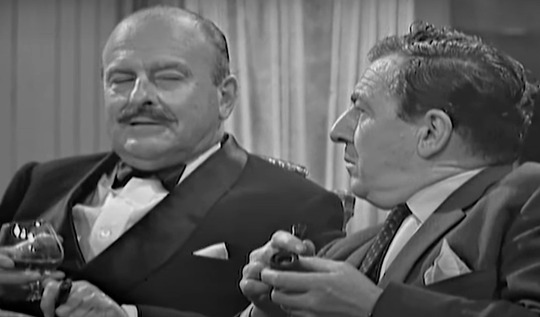
This is a particularly good example: a beefy, handsome, mature, cigar-smoking gentleman. I like to imagine they are working towards putting their drinks down and heading for bed... I know I wouldn't turn either of them down.
25 notes
·
View notes
Text











Enemy at the Door - ITV - January 21, 1978 - March 29, 1980
Drama (26 episodes)
Running Time: 60 minutes
Stars:
Alfred Burke as Major Richter
Bernard Horsfall as Dr. Philip Martel
Simon Cadell as Hauptsturmfuhrer Reinicke
John Malcolm as Oberleutnant Kluge
Simon Lack as Major Freidel
David Waller as Major General Müller
Richard Heffer as Peter Porteous
Helen Shingler as Helen Porteous
Antonia Pemberton as Olive Martel
Emily Richard as Clare Martel
Brian Osborne as Inspector Schulphor
Noel Johnson as Committee President
Richard Hurndall as John Ambrose
John Salthouse as Peter Girard
Morgan Sheppard as Raymond Girard
Martin Fisk as Eric Corbin
Elizabeth Bennett as Mrs. Corbin
Peter Williams as Vicar
Mark Christon as Gefrelte Kirst
Alvar Lidell as BBC Announcer
2 notes
·
View notes
Text
PIN (1988) – Episode 253 – Decades Of Horror 1980s
“Where did you learn to do that?” Learn to do what? Oh…that. Join your faithful Grue Crew – Chad Hunt, Bill Mulligan, and Jeff Mohr along with guest host Ralph Miller – as they visit another strange twist on the ventriloquist/dummy subgenre called PIN (1988).
Decades of Horror 1980s Episode 253 – PIN (1988)
Join the Crew on the Gruesome Magazine YouTube channel! Subscribe today! Click the alert to get notified of new content! https://youtube.com/gruesomemagazine
Gruesome Magazine is partnering with the WICKED HORROR TV CHANNEL (https://wickedhorrortv.com/) which now includes video episodes of Decades of Horror 1980s and is available on Roku, AppleTV, Amazon FireTV, AndroidTV, and its online website across all OTT platforms, as well as mobile, tablet, and desktop.
Isolated by his strange parents, Leon finds solace in an imaginary friend, which happens to be an anatomy doll from his father-the-doctor’s office. Unfortunately, the doll begins to take over Leon’s life, and his sister’s life as well.
Directed by: Sandor Stern
Writing Credits: Sandor Stern (screenplay); Andrew Neiderman (based on the April 1981 novel by)
Selected Cast:
David Hewlett as Leon
Cynthia Preston as Ursula (as Cyndy Preston)
Terry O’Quinn as Dr. Linden
Bronwen Mantel as Mrs. Linden
John Pyper-Ferguson as Stan Fraker (as John Ferguson)
Helene Udy as Marcia Bateman
Patricia Collins as Aunt Dorothy
Steven Bednarski as Leon – Age 13
Katie Shingler as Ursula – Age 11
Jacob Tierney as Leon – Age 7
Michelle Anderson as Ursula – Age 5
Joan Austen as Nurse Spalding
Jamie Stern as Eddie Morris (as James Stern)
David Gow as Officer Wilson
Terrence Labrosse as Dr. Bell
Aline Vandrine as Mrs. Shaver
Joanna Noyes as Mrs. Henry
Andrew Carter as Andy
Leif Anderson as Dave
Joel Johnson as Jack
Shawn Johnson as Tim
Robin MacEachern as Richie
Jonathan Banks as PIN (voice)
Beware the anatomy doll! Ralph Miller III joins Jeff, Bill, and Chad for a look back at PIN (1988) from director Sandor Stern. The cast includes David Hewlett (Scanners II: The New Order, Cube), Cynthia Preston (The Brain, Prom Night III: The Last Kiss), and Terry O’Quinn (Silver Bullet, The Stepfather, Lost). While it struggled to find an audience upon its initial release, critics praised PIN as well-made, bizarre, and disturbing. Fangoria would later feature it in its “101 Best Horror Films You’ve Never Seen.” Now, it’s time for the Grue-Crew to revisit the film and share their thoughts.
At the time of this writing, PIN is available to stream from YouTube.
Every two weeks, Gruesome Magazine’s Decades of Horror 1980s podcast will cover another horror film from the 1980s. The next episode’s film, moving into our Grue Believer Celebration Shenanigans month and chosen by guest host Scott Wells, will be The Queen of Black Magic (1981), an Indonesian horror film quoted as being an inspiration to modern-day Indonesian filmmakers such as Kimo Stamboel and Joko Anwar. You can check this one out on YouTube.
Please let them know how they’re doing! They want to hear from you – the coolest, grooviest fans – so leave them a message or comment on the Gruesome Magazine Youtube channel, on the Gruesome Magazine website, or email the Decades of Horror 1980s podcast hosts at [email protected].
Check out this episode!
1 note
·
View note
Text
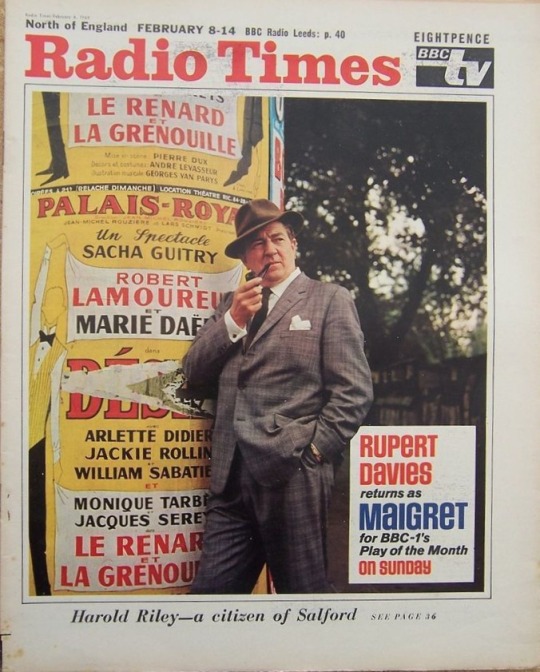
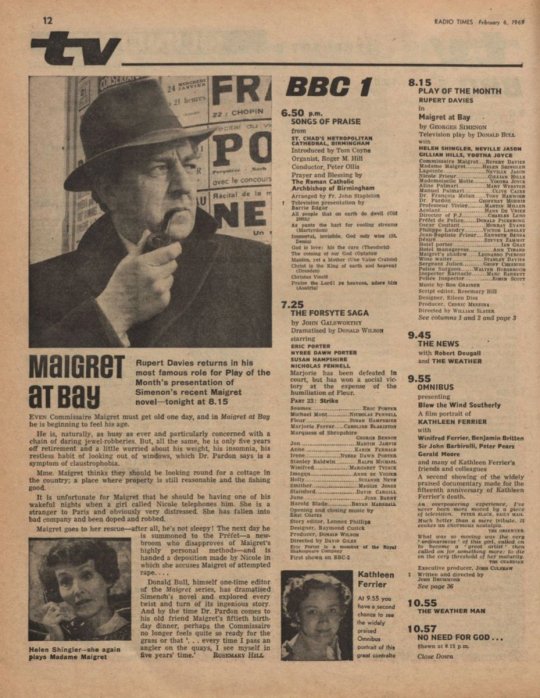
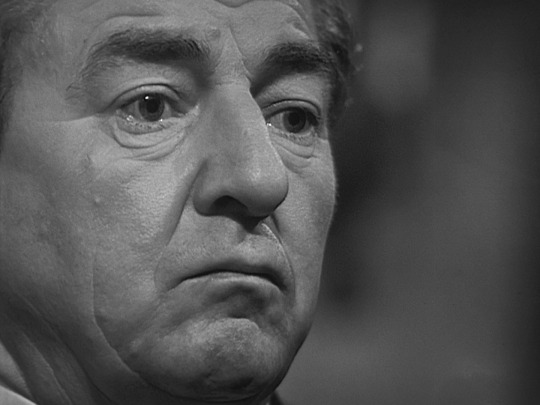

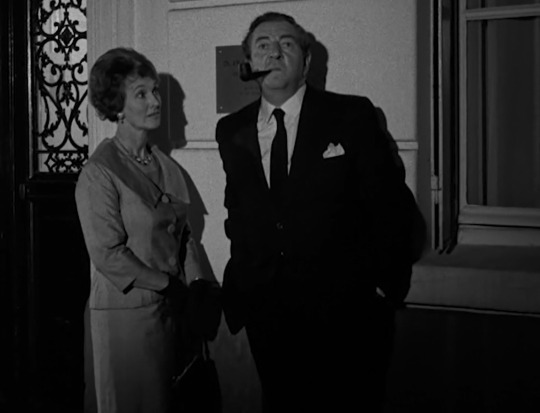
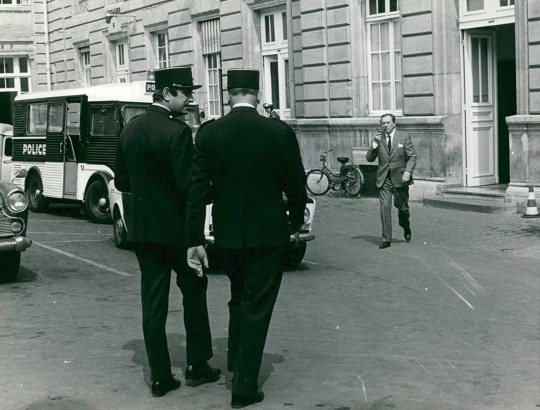


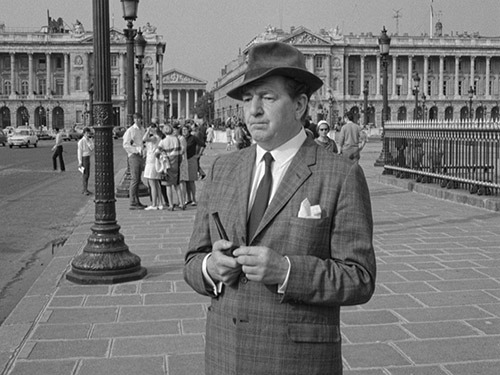

Play of the Month: Maigret at Bay (BBC, 1969)
"You've been in the police service a long time, Monsieur Maigret."
"Since I was 22, Monsieur le Prefet."
"So long? And your duties have taken you widely."
"Oh, the Metro, stations, the big stores, vice, gambling."
"And now you're a division commissaire."
"Yes."
"Within five years of retirement."
"And three days."
"In 28 years you must have seen many changes in methods, procedures?"
"The criminals haven't changed."
"And you, like them, prefer to keep to the old ways as well?"
"They work."
#play of the month#maigret at bay#bbc maigret#maigret#georges simenon#donald bull#william slater#rupert davies#helen shingler#neville jason#gillian hills#yootha joyce#mary webster#clive cazes#tony harwood#geoffrey morris#martin miller#donald pickering#a curious epilogue to the BBC Maigret. Maigret at Bay had actually been announced as the inaugural play when the anthology was first#announced in 1964‚ but contractual issues with Simenon and Davies stage commitments had conspired to delay the production. it would take#another 5 years before everything came together and filming could be completed. it was an unusual choice for a strand which largely adapted#classic novels and plays by the likes of Arthur Miller‚ H. G. Wells‚ Somerset Maugham and Shakespeare. it perhaps speaks to the high regard#in which the series had been held (it had been heavily repeated in the intervening years). whatever the motivation‚ the result is that#rarest of things; a fitting coda to a beloved series. an obvious labour of love‚ the production team reunited leads Davies‚ Shingler and#Jason (Ewen Solon was sadly unavailable) with key crew members (excepting chief writer Giles Cooper‚ who had tragically died in 1966)#the sets for Maigret's office and home were recreated faithfully‚ extensive location work carried out in Paris and there is even a truly#delightful acknowledgement of the original series opening titles‚ as Maigret strikes a match on a wall to light his pipe at the beginning.#it can honestly be rare to find this kind of care and clear respect in a belated reunion to a previous series‚ but this is really probably#the very best ending the show could have hoped for: an older Maigret‚ approaching retirement‚ out of step with new superiors but as capable#and as brilliant as ever. a very worthy final outing. Davies never ruled out a return but it wasn't to be; so farewell‚ Insp Maigret
4 notes
·
View notes
Photo








Everlasting Love
Rupert Davies as Jules Maigret and Helen Shingler as his wife Louise in “Maigret at Bay” (1969)
#rupert davies#helen shingler#maigret#jules maigret#madame maigret#maigret at bay#perfect couple#perfect wedded bliss#i love them together
14 notes
·
View notes
Photo

Rupert Davies as Jules Maigret and Helen Shingler as his wife Louise in “Voices from the Past” (1962)
#rupert davies#helen shingler#maigret#voices from the past#perfect couple#perfect wedded bliss#my gif
3 notes
·
View notes
Link
@mariocki Randomly clicked on Network’s YT channel today and got this! (For a blu-ray release, but they say in the comments they should be doing a DVD as well after.) Relevant to both our interests, I think, as James Maxwell and Alfred Burke guest together as brothers in an ep. (Wiki says it survives in its entirety barring the pilot.)
But also, even more intriguingly, this is a BBC series from Network. Have they worked out some arrangement, or is this a one off? !!!! basically.
#maigret#1960s#network#rupert davies#detectives#book adaptations#helen shingler#(one of the regulars)#i don't want to get too excited but this is def hopeful news on the old telly front#which had been getting a bit depressing with the demise of simply media
9 notes
·
View notes
Text

Actors Peter Cushing and Helen Shingler enjoy a relaxing cup of tea between rehearsals for the television play 'Home at Seven' by R. C. Sherriff, 8th August 1956.
18 notes
·
View notes
Text

Peter Cushing and Helen Shingler enjoy a relaxing cup of tea between rehearsals for the television play 'Home at Seven' by R. C. Sherriff, August 1956.
4 notes
·
View notes
Photo










Helen Shingler in Maigret (1960–1963)
Happy 100th Birthday Helen Shingler born: August 29, 1919 in London, England, UK, Mother of actor/singer Murray Head and Anthony Head.
44 notes
·
View notes
Text




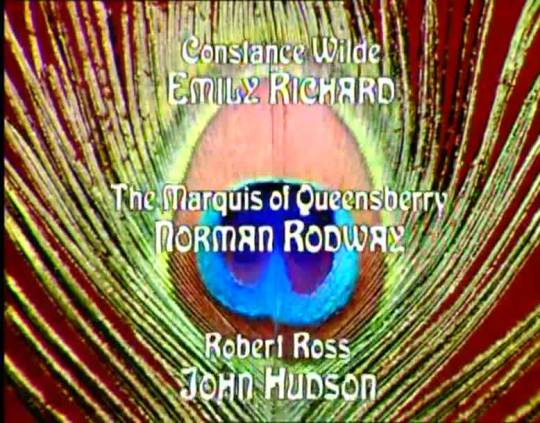
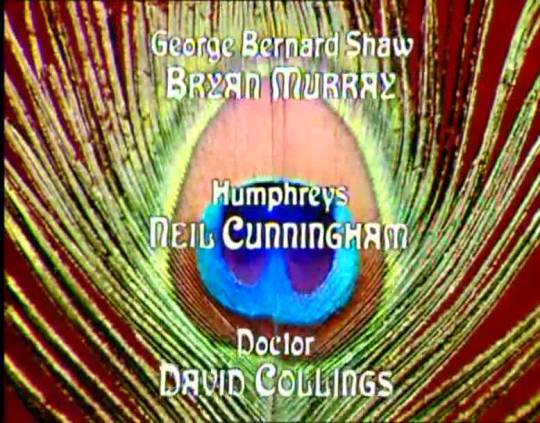

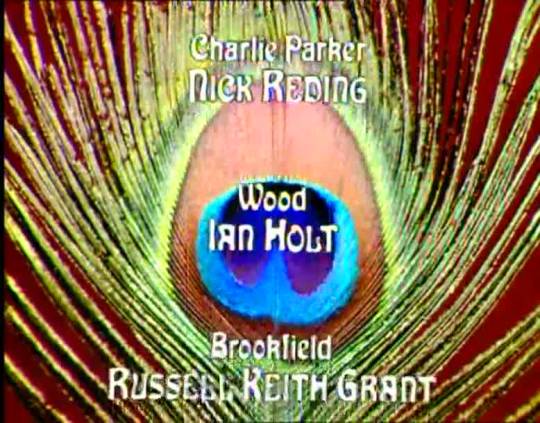

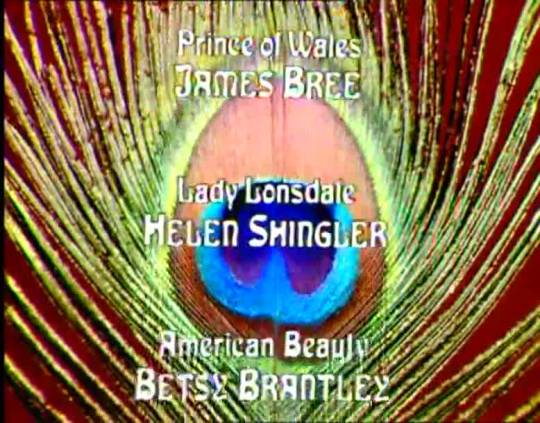

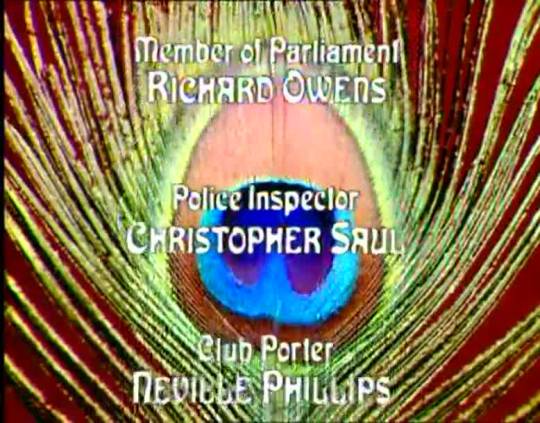





Oscar - BBC Two - March 26 - 28, 1985
Drama / Biography (3 Episodes)
Running Time: 60 minutes
Stars:
Michael Gambon as Oscar Wilde
Robin Lermitte as Lord Alfred Douglas,
Tim Hardy as Alfred Taylor
Emily Richard as Constance Wilde
Norman Rodway as the Marquis of Queensberry
John Hudson as Robert Ross
Bryan Murray as George Bernard Shaw
Neil Cunningham as Humphreys
David Collings as Doctor
Donald Sumpter as Clibborn
Karl Howman as Fred Atkins
Nick Reding as Charlie Parker
Ian Holt as Wood
Russell Keith Grant as Brooklield
Peter Cellier as Beerbohm Tree
Anne Lambton as Mrs. Tree
John Repsch as George Alexander
James Bree as the Prince of Wales
Helen Shingler as Lady Lonsdale
Catherine Strauss as Lily Langrey
Robert Burbage as Max Beerbohm
Michael Pennington as Narrator
#Oscar#TV#BBC Two#Biography#1985#1980's#Drama#Michael Gambon#Robin Lermitte#Tim Hardy#Emily Richard#Norman Rodway
1 note
·
View note
Photo










Rx Murder (1958) Director: Derek N. Twist. Writers: Joan Fleming, John W. Gossage and Derek N. Twist from Joan Fleming’s 1955 novel ��The Deeds of Dr Deadcert’
American doctor Jethro Jones (Rick Jason) comes to a quiet English seaside resort to investigate the activities of its leading medical doctor, Henry Dysert (Marius Goring). He learns from Miss Bettyhill (Mary Merrall), the town-gossip, and others that 'the good doctor' might not be all that good, since each of his three wives (only one at a time), Louise (Vida Hope), Charlotte (Helen Shingler) and Stella (Sandu Scott), had mysterious and tragic deaths. The non-gossiping townsmen had regarded the three deaths, each of which left Dr Dysert in better financial shape, as unfortunate personal tragedies. Jason has only a short time to prove that Dysert was a multiple wife-killer, since Kitty Mortlock, Dr Dysert’s secretary (Lisa Gastoni) appears to be the next designated victim, and Jason has fallen in love with her himself. mariusgoring.com
2 notes
·
View notes
